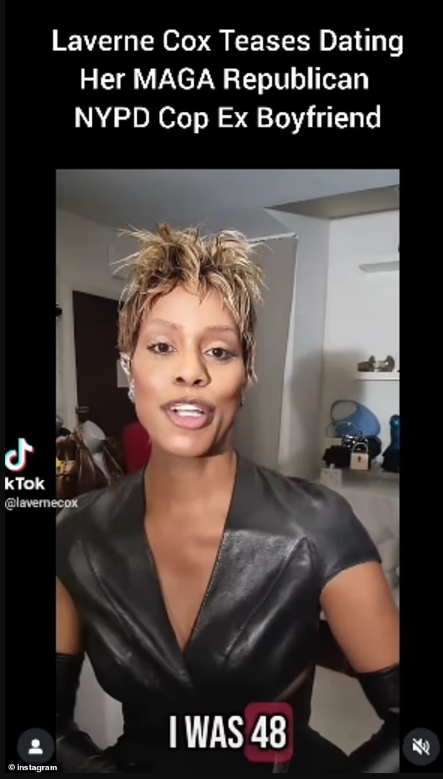Laverne Cox, the celebrated transgender actress known for her role in “Orange Is the New Black,” finds herself at the center of a social media storm after revealing intimate details about a past relationship that has left many of her progressive fans questioning her political authenticity.
The 53-year-old star sparked intense backlash when she disclosed during a promotional video for her upcoming one-woman show that she had secretly dated a Trump-supporting New York City police officer for four years. The revelation became even more controversial when Cox described her former partner as a “blonde hair, blue-eyed MAGA Republican voter” who was 22 years her junior.
“He was 26, I was 48,” Cox explained in the video, adding that despite their political differences, they were “madly in love” during their relationship. She also candidly admitted to finding him physically attractive, describing how “hot” he was while maintaining that she never adopted his conservative viewpoints.

The response from Cox’s fanbase was swift and unforgiving. Social media erupted with criticism from supporters who felt betrayed by what they perceived as hypocrisy from someone who has been a vocal advocate for progressive causes and LGBTQ+ rights.
“You should’ve taken this to the grave, babe,” one follower wrote, while another questioned her decision-making process: “So you recorded this, edited, and STILL pressed upload?” The criticism grew more pointed as fans expressed dismay at Cox’s apparent pride in the relationship, with one commenting, “It’s the smiling with pride, that’s bothering me. As if it were a badge of honor.”
Perhaps most cutting was the observation from another fan: “Sooooo the morals are dismissed when he’s hot. Got it.”
Recognizing the severity of the backlash, Cox attempted damage control by releasing an extensive 53-minute follow-up video addressing the controversy. In this lengthy response, she defended both her personal choices and her political integrity while criticizing some of her fans for what she characterized as dehumanizing behavior.
“What was beautiful about the relationship I had with my ex is that for three and a half of the four years we dated it was amazing and we would agree to disagree, and managed to still have fun, managed to still see each other’s humanity and love each other across these differences,” Cox explained.
She also pushed back against accusations that she had compromised her values, emphasizing that she wasn’t MAGA and had “never” voted for Trump. Cox criticized some of her supporters for “dehumanizing people with different political beliefs,” stating this approach was “not consistent with my values.”
However, the clarification did little to quell the outrage. Critics continued to challenge her choices, with one asking pointedly, “Respectfully, why are you navigating a relationship with a blonde, blue-eyed, MAGA, Republican?”
The criticism became more personal and pointed, with supporters arguing that her former boyfriend’s political allegiances represented a direct threat to her identity and community. “He voted against YOU! He voted against who you are and what you stand for, your basic rights! He voted against who you advocate for, your trans community. You may have ‘loved’ him, but he most certainly did NOT love you,” one commenter wrote.
Another added, “Respectfully…..I think you need to love yourself more. Because you SIGNIFICANTLY lowered yourself to be with a man who did not deserve you.”
The controversy appears particularly jarring given Cox’s recent public statements about the political climate. Just last November, she told Variety that she and her transgender friends were researching potential moves to Europe and the Caribbean due to concerns about Donald Trump’s presidency.
Cox had gone so far as to draw historical parallels between current anti-LGBTQ+ rhetoric and pre-N*zi Germany, referencing the thriving queer community in Berlin before the rise of fascism. “There was this a thriving community of queer people in Berlin pre the rise of N*zism. They attacked Jewish folks. They attacked immigrants, they attacked queer and trans people,” she said.
“I don’t want to be in too much fear, but I’m scared. As a public figure, with all my privilege, I’m scared, and I’m particularly scared because I’m a public figure,” she continued, expressing concern about being targeted given what she described as nearly $100 million spent on anti-trans advertisements.
The revelation of Cox’s past relationship has created a complex dialogue about personal relationships versus political beliefs. Can love truly transcend fundamental ideological differences, especially when those differences involve policies that directly impact one’s identity and community?
For Cox, who has built her career partly on advocacy and representation for marginalized communities, her current situation has disappointed many of her most ardent supporters.


